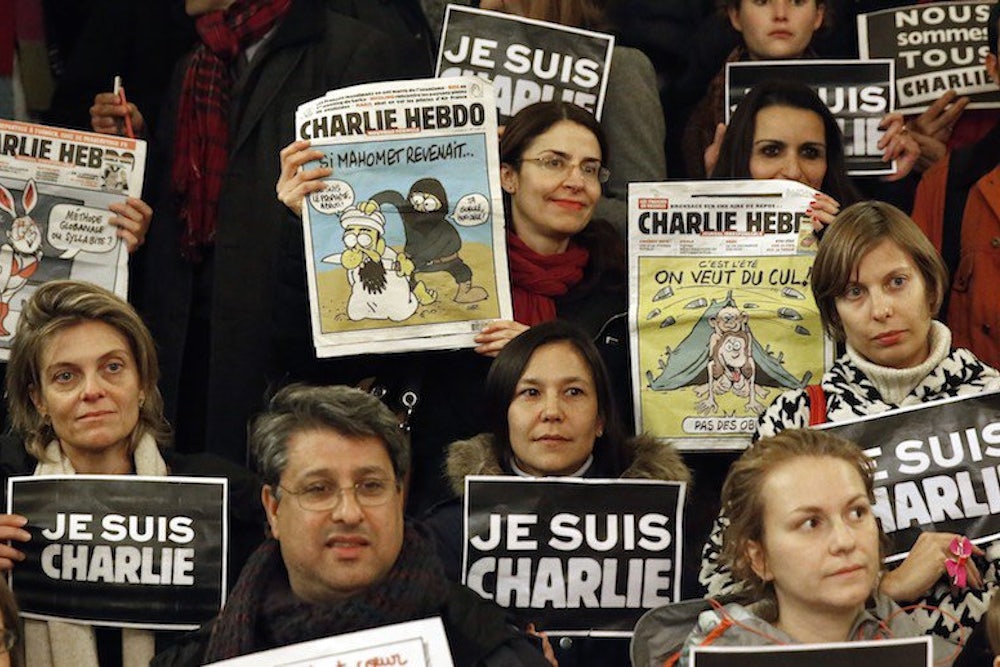On Wednesday evening, nearly 24 hours after a group of Muslim religious fanatics gunned down 12 people at the Paris office of weekly satirical newspaper Charlie Hebdo, I paid my first visit to Stormfront.org, a hate website that dubs itself “the voice of the new, embattled White minority.”
Satire and racist agitprop aren’t coterminous, obviously, but they aren’t mutually exclusive either, and I wanted to see how the truly vicious lampoon the people they hate. One Stormfronter asked of his fellow white nationalists, “Has anyone here have any whacky Anne Frank memes. If so please share them.” His solicitation went unanswered, but after some poking around, I found an Anne Frank meme captioned “Hide and Seek World Champion, 1942-1944,” at which point I figured I’d seen enough. The question of what constitutes religious blasphemy is subjective, but that met my definition.
Then I toggled back to this New York magazine article, in which Jonathan Chait posits that the “right to blaspheme religion is one of the most elemental exercises of political liberalism. One cannot defend the right without defending the practice.”
Suffice it to say, I’m not going to shut down Stormfront or track down the creator of that Anne Frank poster and murder him. But I don’t think the poster is defensible.
The massacre in Paris has awakened a liberal tendency to valorize all objects of illiberal enmity. If an Islamist kills a westerner for a particular blasphemy, then the blasphemy itself must be embraced. We saw something similar just last month when countless Americans, rightly aggrieved by the extortion of a U.S.-based movie company, became determined to find reason to praise a satirical film they would've otherwise panned. This is clearly not always the correct reaction to terrorism or extortion. Here, liberals can learn a lesson from Second Amendment absolutists who nevertheless condemn open-carry demonstrations in fast food restaurants.
Charlie Hebdo’s cartoons don’t bother me personally. Some of them strike me as inspired, some as unsavory. But I’m also an insensitive person. Others—here I mean civilized people, not barbaric murderers—saw some of Charlie Hebdo’s output differently. And their complaints about the weekly aren’t necessarily undermined when a murderous reactionary with similar complaints addresses his grievances with a Kalashnikov rather than a boycott or a letter to the editor.
The key is that the violent tendencies of aggrieved parties can’t become the basis of appeals to self-censorship. Chait quotes Time’s Paris bureau chief, Bruce Crumley, arguing back in 2011 that Charlie Hebdo should’ve let religious extremists dictate its aesthetic choices, because offensive cartoons “openly beg for the very violent responses … their authors claim to proudly defy in the name of common good.”
That impulse needs to be resisted. But it does not, as Chait argues, “[lie] uncomfortably close to the mainstream Western liberal view.”
To bolster his case that it does, Chait quotes then-White House press secretary Jay Carney, addressing a Charlie Hebdo cartoon in 2012.
[W]e are aware that a French magazine published cartoons featuring a figure resembling the Prophet Muhammad, and obviously, we have questions about the judgment of publishing something like this. We know that these images will be deeply offensive to many and have the potential to be inflammatory. But we’ve spoken repeatedly about the importance of upholding the freedom of expression that is enshrined in our Constitution.
In other words, we don’t question the right of something like this to be published; we just question the judgment behind the decision to publish it.
An ungenerous read of Carney’s statement is that publications like Charlie Hebdo display poor judgment if they publish things that have the potential to be inflammatory—a gentler admonition than Crumley’s but substantively indistinguishable. More generously Carney was calling a particular cartoon stupid, and not worth publishing irrespective of its potential to be inflammatory. The truth likely resides somewhere in the middle, where Carney—speaking as a mouthpiece for a government invested in improving relations with Muslim societies—wanted to criticize the cartoon and turn down the geopolitical temperature simultaneously. If Carney had been responding to an orthodox Jewish uprising against neo-Nazis distributing the Anne Frank poster in Brooklyn, Carney’s response would've seemed bizarrely tepid, and we wouldn’t have read polemics about our duty to defend the practice of blasphemy.
The right to blaspheme religion is, as Chait has it, one of the most elemental exercises of political liberalism. But so is the right to say, “You're being an asshole.”
